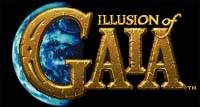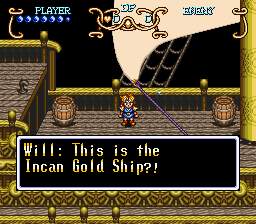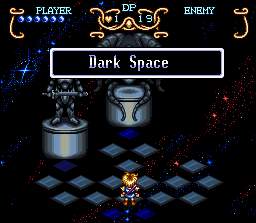|
|

|
BATTLE SYSTEM
|

|
INTERACTION
|

|
ORIGINALITY
|

|
STORY
|

|
MUSIC & SOUND
|

|
VISUALS
|

|
CHALLENGE
|
Easy
|
COMPLETION TIME
|
5-10 Hours
|
|
OVERALL
4.0/5
|
Rating definitions
|
|
|
Will is a boy blessed with telekinetic powers who lives in the town of South Cape with his grandparents. His father, the explorer Olman, once took him on an expedition to the fabled Tower of Babel, where he and his entire entourage disappeared, with only Will returning home safely. Illusion of Gaia follows his journey to discover the fate of his father and somehow stop a comet from striking his planet along the way.
During his journey, Will must battle a number of enemies to advance, armed only with his flute. Even so, he can still fight pretty well, for in addition to his quick strikes, Will can perform a nifty forward leap attack for additional damage. Will eventually acquires a few abilities to help him advance through the game, such as a slide that can get him through short holes and damage enemies decently, and a ramming charge that can break walls and also deal nice damage against foes. There is no experience of which to speak in Gaia, with Will having to clear entire rooms of enemies to advance his stats, which include HP, attack power, and defense.
 Yes, and you're lucky it doesn't sink.
Yes, and you're lucky it doesn't sink.
|
|
Enemies also drop Dark Power gems (and once in a blue moon, a gem that recovers some HP) that Will can gather; a hundred Dark Power points gives him a life, which, when he loses all his HP, allows him to restart the current area with half HP. If Will doesn't have any lives, he starts further back from the area where he died, though with all HP. As far as I know, Gaia could've easily done without this system, although it certainly doesn't detract from the game.
He also gains the ability to transform into two different forms (the second coming late into the game, although he accesses the first early on) at Dark Spaces (which also serve as save points that recover all HP). Both forms have their own unique abilities, with upgrades for the first form's powers coming frequently throughout the game at certain Dark Spaces. In all forms, moreover, Will can use his telekinesis to draw Dark Power gems near and move certain objects around.
Finally, there is no currency of which to speak in Gaia, and thus no opportunity to purchase any items, so the game could become a bit tough if the player uses all healing items gained rarely through the game, although it's still easy overall, with a few bosses posing the most challenge.
Interaction in Gaia is pretty clean, with the only real issue being the dash system, where the player must constantly press the directional pad twice in the direction in which they want Will to dash. Though inventory space is limited to sixteen slots, moreover, I rarely, if ever, reached this limit. Additionally, any time in a dungeon, the player can bring up a map showing the relative locations of enemies, treasure chests, and Dark Spaces in the current room. The translation does contain some minor errors, although Gaia is still very user-friendly.
Gaia, in its time, was a unique action RPG, with features like telekinesis, the hero being able to transform into two different forms, and so forth, not being present in other ARPGs then, though many locations within the game are based on real places.
 A boy and his dark space
A boy and his dark space
|
|
Gaia's story showed great potential, yet somewhat falls flat in execution. This isn't to say the plot is garbage, with the pacing being solid and all, especially given the game's length, although most of the characters that show up through the game really don't serve much purpose to the grand scheme of events. For instance, a villain called the Jackal gets mention early on, although the game doesn't really do much with him, and he only shows himself much later without having affected the story very much. In the end, Gaia doesn't have the best plot nor does it have the worst.
Much of the music in Gaia contains an "epic" feel, and does a pretty decent job fitting the game's moods and environs. Some of the sound effects, though, such as that when you kill an enemy or when something bursts apart, are fairly grating, although the aurals serve the game well overall.
The visuals, moreover, are among the best to appear on the Super NES, with nicely-detailed scenery and decently-proportioned character sprites, even if these sprites don't show much emotion.
Five to ten hours. If it takes you more than this to beat Illusion of Gaia, you're not my son. Well, you're probably not my son, anyway, but there really isn't much to boost playing time beyond this range, what with the only real sidequest being an extra dungeon accessible only after finding all fifty Red Jewels during the game. Still, despite its meager length, Gaia is one of the most enjoyable action RPGs to appear on the Super NES, standing well among the likes of Secret of Mana and A Link to the Past. It might not have the best story, but its other aspects are solid, making the game a nice trip down memory lane.
Review Archives
|









